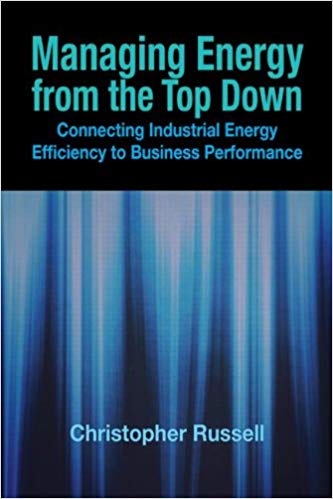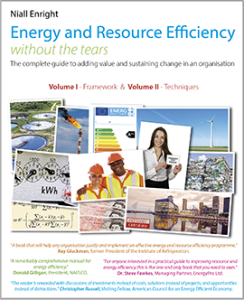[amazon_link id=”1439829969″ target=”_blank” container=”” container_class=”” ] [/amazon_link]This is almost certainly one of the best book on energy management ever written.
[/amazon_link]This is almost certainly one of the best book on energy management ever written.
I’ve got to say right from the outset that Christopher Russell is absolutely spot-on with his diagnosis of the reasons why organisations fail to realise the very substantial financial benefits associated with energy efficiency.
It is refreshing that he not only diagnoses the barriers, but offers a wide range of solutions – some innovative, some challenging, but all thoroughly practical.
His focus on leadership, organisation, roles and financial business cases touches the core issues for successful energy management. He beautifully demonstrates the stupidity and value-destruction in the way many organisations approach energy efficiency. The challenge is not around technical solutions (we largely know how to save energy) but in getting these solutions implemented – in raising them to the top of the corporate agenda.
The central challenge for business is how we can develop continuous improvement process which will deliver savings year on year as we urgently decarbonise our economies to avoid catastrophic climate change.
At just over 150 pages, this is a rather short but nevertheless very satisfying read. It is written well in an enjoyable style and with a logical progression of concepts. Don’t let the size put you off – every page is huge value for money. There is some US focus – such as an appendix on Electricity Deregulation – but the content is widely relevant.
This book should be on the curriculum of every energy management course.
Update
Just found the book on LULU for only £21 – the book has a different title, “The Industrial Energy Harvest” but the contents are the same! I will update the “value for money” rating accordingly. Follow this link to the book.
Further Reading
Christopher Russell has an excellent blog, called “Energy pathfinder” with a treasure trove of practical advice for energy efficiency practitioners and policy-makers.
[easyreview title=”IMHO: Managing Energy from the Top Down” cat1title=”Usefulness” cat1detail=”A superbly practical book full of ideas for any energy managers. Focus on organisational and financial issues rather than technical ones.” cat1rating=”5″ cat2title=”Relevance” cat2detail=”Particularly focused on industrial facilities, but concepts are equally applicable to public and commercial organisations. Small amount of US bias, but this does not detract.” cat2rating=”4.5″ cat3title=”Accessibility” cat3detail=”Great value for the complete novice as well as highly experienced practitioners.” cat3rating=”5″ cat4title=”Value for money” cat4detail=”Based on the LULU price this scores well!” cat4rating=”4.5″ summary=”An outstanding Resource for anyone who wants to get to grips with the organisational aspects of energy efficiency rather than just focus on technology.”]
| [amazon_enhanced asin=”1439829969″ /] | KEY Usefulness: how will this book support a resource efficiency practitioner? Does the book give real-world examples and tools? Are reference to other sources of information well documented. Is it an objective and credible source? Relevance: how widely applicable is this book in delivering practical resource efficiency? Is it only for a narrow niche or are the concepts widely applicable? Are there good, contemporary examples of best practice? Accessibility: how well written and structured is the book? Is there an assumption about prior knowledge? Value for money: Taking into account the other parameters is this book a good investment? Overall: The average of the previous ratings. IMHO= in my humble opinion. Please post a response to the review if you feel I have got this wrong! |



0 Comments